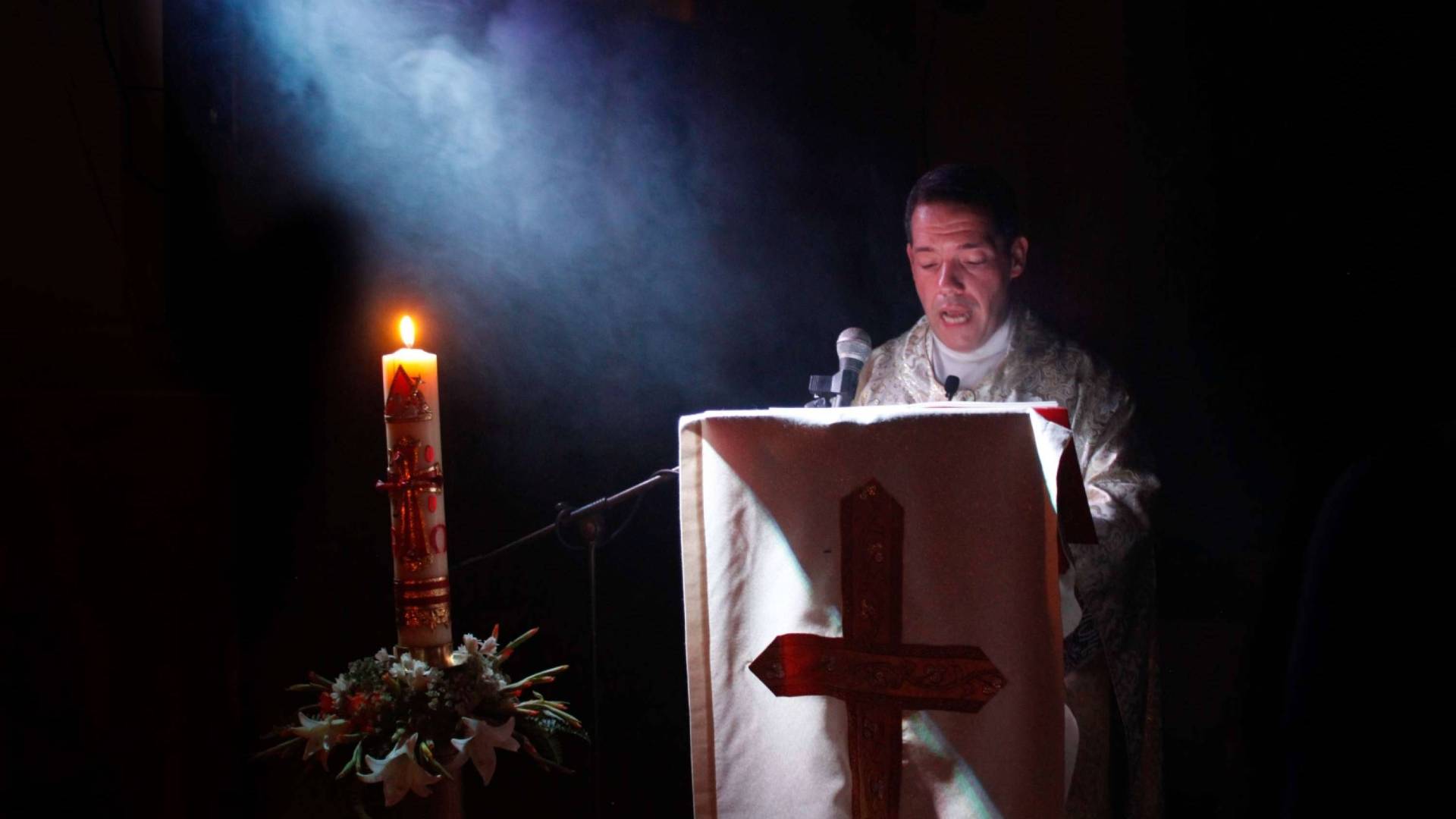

Deacon-structing: Reading Scripture – Part Two
Deacon Pedro
Friday, February 17, 2023

Paschal Vigil. Photo by Yandry Fernández Perdomo on Cathopic.
Last time I tried to make a case for reading Scripture. Our faith teaches that, not only should we read and study Scripture, but we should pray with Scripture.
When I was growing up in the 70s, this was not taught in Catechism class. Although, come to think of it, it’s not like anyone taught us that we shouldn’t read, study or pray with Scripture. Every class or youth group meeting began with a Scripture passage, we read Scripture as we learned about Bible stories; I’m sure we quoted Scripture while praying… as kids, we just didn’t know it.
When I became an adult, I began to look closer at the Church's biggest prayer, the Mass. It was not until then that I learned that the Mass is just one Scripture quote after the other.
So why do Catholics have the reputation that we don’t know our Scripture? Is it that we don’t memorize Scripture passages? How often have you been asked to quote Scripture and have not been able to? Surely, you can quote Luke 1:28 “Hail, full of grace, the Lord is with thee: blessed are you among women.” Or Matthew 6:9-13: “Our Father in heaven, hallowed be your name. Your kingdom come, your will be done, on earth as it is in heaven. Give us this day our daily bread, and forgive us our debts, as we also have forgiven our debtors. And lead us not into temptation, but deliver us from evil.”
How about Luke 7:6-7: “Lord, I am not worthy to have you come under my roof… But say the word, and my servant will be healed”; Luke 2:14 “Glory to God in the highest, and on earth peace to people of good will” or Psalm 118:26: “Blessed is he who comes in the name of the Lord.”?
The truth is that, just by going to Mass, we are praying with Scripture.
The Vatican II document Dei Verbum, On Divine Revelation, says that “since everything asserted by the inspired authors or sacred writers must be held to be asserted by the Holy Spirit, it follows that the books of Scripture must be acknowledged as teaching solidly, faithfully and without error that truth which God wanted put into sacred writings for the sake of salvation.” (#11. Also see the Catechism of the Catholic Church 105-108) Dei Verbum then quotes Scripture: "Therefore 'all Scripture is divinely inspired and has its use for teaching the truth and refuting error, for reformation of manners and discipline in right living, so that the man who belongs to God may be efficient and equipped for good work of every kind' (2 Timothy 3:16-17)."
Also, the Catechism itself quotes Dei Verbum by stating “Such is the force and power of the Word of God that it can serve the Church as her support and vigour, and the children of the Church as strength for their faith, food for the soul, and a pure and lasting fount of spiritual life." Hence "access to Sacred Scripture ought to be open wide to the Christian faithful." (CCC 131, quoting DV #21, 22)
It continues:
"Therefore, the study of the sacred page should be the very soul of sacred theology. The ministry of the Word, too - pastoral preaching, catechetics and all forms of Christian instruction, among which the liturgical homily should hold pride of place - is healthily nourished and thrives in holiness through the Word of Scripture." (CCC 132, quoting DV #24)
and:
“The Church "forcefully and specifically exhorts all the Christian faithful. . . to learn the surpassing knowledge of Jesus Christ, by frequent reading of the divine Scriptures.”
Finally, it quotes St. Jerome: “Ignorance of the Scriptures is ignorance of Christ.” (CCC 133)
In short, the Church venerates Scriptures just as much as she venerates the Body of Christ, as both of these nourish and govern the whole Christian life (see CCC 141).
And because the Church gets her teaching, not just from Tradition, but also from Scripture, she has learned, from Scripture, that the fullness of God’s revelation can be found within it.
We already read what St. Paul wrote in 2 Timothy about Scripture. This is probably one of the best-known passages about Scripture. It’s worth quoting again: “All Scripture is breathed out by God and profitable for teaching, for reproof, for correction, and for training in righteousness, that the man of God may be complete, equipped for every good work.” (2 Timothy 3:16-17)
In Romans, Paul also writes, “For whatever was written in former days was written for our instruction, that through endurance and through the encouragement of the Scriptures we might have hope.” (15:4)
I suppose Paul was referring to the Old Testament. He would have been familiar with Isaiah: “So shall my word be that goes out from my mouth; it shall not return to me empty, but it shall accomplish that which I purpose, and shall succeed in the thing for which I sent it” (55:11), and also with Psalm 119: “Your word is a lamp for my feet, a light on my path” (v. 105).
Indeed, the Word of God, Scripture, lights our way and nourishes us.
This is because the Word of God is alive. The author of Hebrews tells us that “the word of God is living and active, sharper than any two-edged sword, piercing to the division of soul and of spirit, of joints and of marrow, and discerning the thoughts and intentions of the heart. And no creature is hidden from his sight, but all are naked and exposed to the eyes of him to whom we must give account.” (Hebrews 4:12-13)
Which is why Jesus himself quoted and used Scripture to teach his disciples. (We don’t have space here to show every place where Jesus quotes or refers to the Old Testament or a Psalm, but it’s worth looking up. I counted about 50 times!) Perhaps the most memorable instance is on the road to Emmaus when Jesus uses Scripture to explain everything that was going on to the two disciples: “And beginning with Moses and all the Prophets, he interpreted to them in all the Scriptures the things concerning himself.” (Luke 24:27)
There is no doubt that we need to read, study and pray with Scripture. Indeed, ignorance of Scripture is ignorance of Christ. The Word of God is alive and active; it nourishes us and sustains us. Jesus said that “Heaven and earth will pass away, but my words will not pass away.” (Matthew 24:35) That’s because, as the first chapter of the Gospel of John reminds us, He, himself, is the Word.
The Catechism explains:
 Every week, Deacon Pedro takes a particular topic apart, not so much to explore or explain the subject to its fullness, but rather to provide insights that will deepen our understanding of the subject. And don’t worry, at the end of the day he always puts the pieces back together. There are no limits to deaconstructing: Write to him and ask any questions about the faith or Church teaching: [email protected]
Every week, Deacon Pedro takes a particular topic apart, not so much to explore or explain the subject to its fullness, but rather to provide insights that will deepen our understanding of the subject. And don’t worry, at the end of the day he always puts the pieces back together. There are no limits to deaconstructing: Write to him and ask any questions about the faith or Church teaching: [email protected]
“Christianity is the religion of the 'Word' of God, a word which is 'not a written and mute word, but the Word which is incarnate and living.' If the Scriptures are not to remain a dead letter, Christ, the eternal Word of the living God, must, through the Holy Spirit, 'open [our] minds to understand the Scriptures' (Cf. Luke 24:45)." (CCC 108)I hope that you are renewed in your desire to read Scripture, every day. Maybe you can follow me on Instagram and take my daily morning Scripture passage to pray with you throughout the day. Maybe you can use any number of other resources out there. Maybe this can be your Lenten discipline this year: daily reading, study and prayer of Scripture. Let me know if you need some help or guidance with that.
 Every week, Deacon Pedro takes a particular topic apart, not so much to explore or explain the subject to its fullness, but rather to provide insights that will deepen our understanding of the subject. And don’t worry, at the end of the day he always puts the pieces back together. There are no limits to deaconstructing: Write to him and ask any questions about the faith or Church teaching: [email protected]
Every week, Deacon Pedro takes a particular topic apart, not so much to explore or explain the subject to its fullness, but rather to provide insights that will deepen our understanding of the subject. And don’t worry, at the end of the day he always puts the pieces back together. There are no limits to deaconstructing: Write to him and ask any questions about the faith or Church teaching: [email protected]Related Articles:
<<
SUPPORT LABEL
$50
$100
$150
$250
OTHER AMOUNT
DONATE
Receive our newsletters
Stay Connected
Receive our newsletters

Stay Connected









